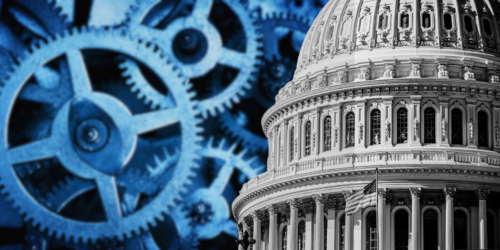As DOGE careens through the US government, shuttering agencies, laying off federal workers, and halting payments, observers rightfully wonder if there is a method to the madness and moreover who or what will replace what is lost. Few imagine things can be put back together as they were – even if there is the will to do so. In her address to the AI, Science, and Society conference hosted by the Institut Polytechnique de Paris earlier this month, Professor Danielle Allen argued that what we are seeing is the real time implementation of an extreme ideological vision of the role that technology and a small cohort of its wealthiest leaders should have in the world.
In this paradigm, sometimes called Neoreactionism (NRx) or extreme corporate libertarianism, the world is divided into the talented and untalented, Allen explained, where talent is measured by technological innovation and corporate success. The talented comprise a natural aristocracy whose achievements and clear superiority deserve to amass unchecked power and wealth without regard for the common good, equality, or national borders. Efficiency is king. They seek to replace the modern nation state system with corporate states and care little about constitutional democracy or social cohesion. It makes sense in this view of the world to destroy the institutions and mechanisms designed to check these talented leaders and replace them with technologies, like AI, that by design and without regulation can advance their interests.
Allen noted that an alternative paradigm, effective altruism or synthetic technocracy, similarly privileges the wealth accumulation of the tech elite, while recognizing the value of protecting those made less well-off by technological advancements. Policies like Universal Basic Income become necessary to protect individual material needs and create a society-wide safety net in response to the inevitable income loss caused by technological advances like increasing automation. Technical capacities remain firmly in corporate control, but the people maintain their voice through the state. A segmented, welfare dependent society can emerge in this worldview, especially when money is categorized as speech and capital and power is allowed to accumulate among a very few. Allen explained this paradigm fails to recognize that human flourishing and healthy democracy require more than a material safety net – empowerment is political, social, and economic. Individuals seek freedom, equality, association, and to be productive according to their own talents and interests.
Allen described a third option, which policy makers and believers in constitutional democracy can use right now to guide their own actions and to offer a hopeful alternative to what replaces DOGE. Plurality, or digital democracy, recognizes that people – with all their different talents, interests, and needs – and their flourishing should be the center from which technology is developed, and public policies are made. Pluralism recognizes that there are multiple intelligences, not a single one, and that encouraging these differences and facilitating social cohesion actually leads to better economic and political outcomes. Technologies can be designed to increase all human capacity, to complement not diminish individual strengths, and to allow us all to more easily collaborate and participate in our political and civic lives. Technology can be employed to make government more responsive to the people and, yes, also more efficient. If Pluralism replaces the current neoreactionary chaos and guides the renovation of the nation’s digital public and civic infrastructure, Allen explained, we can in fact build the greatest democratic government of all time, with openness, accountability, and transparency – a GOAT to replace DOGE.






